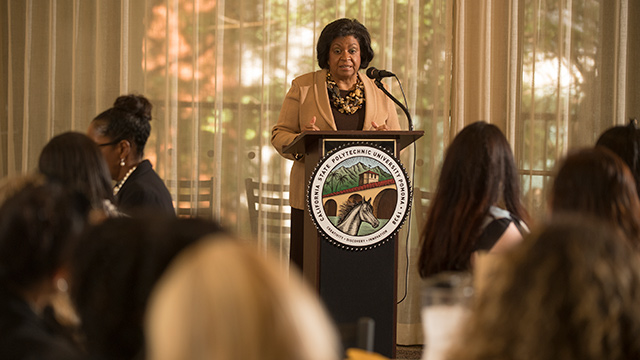Cal Poly Pomona President Soraya M. Coley has been fighting for opportunity as long as she can remember, a personal mission instilled in her as she grew up in the segregated south.
Accordingly, the significance of her new position as the presidential sponsor of the ACE Women's Network of Southern California was apparent on Friday during the organization's first event at its new host institution.
President Coley was the keynote speaker for her first event at the helm of the network that supports the advancement of women in leadership in higher education. Recently retired CSU San Marcos president, Karen Haynes, was the previous presidential sponsor of the ACE Women's Network of Southern California.
"While we've seen progress since the network started, we understand there is so much more to do," Coley said. "We envision this organization as a space where we continue to better understand the needs of women in higher education, to build networks and to support you in your professional goals."
The organization that would become the American Council on Education Women's Network began in 1977, courtesy of a grant from the Carnegie Corporation.
The National Center for Education Statistics didn't start tracking gender on its annual faculty count until 1987. At the time, women accounted for 33 percent of all faculty in the country. By 2017, that figure had grown to 50 percent.
Based on the 2017 NCES data, only 33 percent of full professors are women, a disparity seen in leadership roles as well. According to the latest data from ACE, women make up only 27 percent of the deans of academic colleges and less than one-third of university presidents are women.
"Yes, it's true that power can be given," Coley said. "But more often power is derived from one's own personal drive and recognition that the status quo is not acceptable, that there must be improvement in conditions and entrenched conditions must change."
Coley has been part of that change in the CSU system. July of 2018 marked the point when the majority of CSU presidents became women. Twelve of the 23 campuses are currently led by women, the first such occurrence in the 59-year history of the system.
But there is still work to be done. This is where the ACE Women's network steps in.
"A body at rest wants to stay at rest and a body in motion wants to stay in motion," Coley said. "I equate power like that, which means there must be a countervailing force to disrupt something. I call on each one of us to see ourselves as critical to working towards our desired state."


